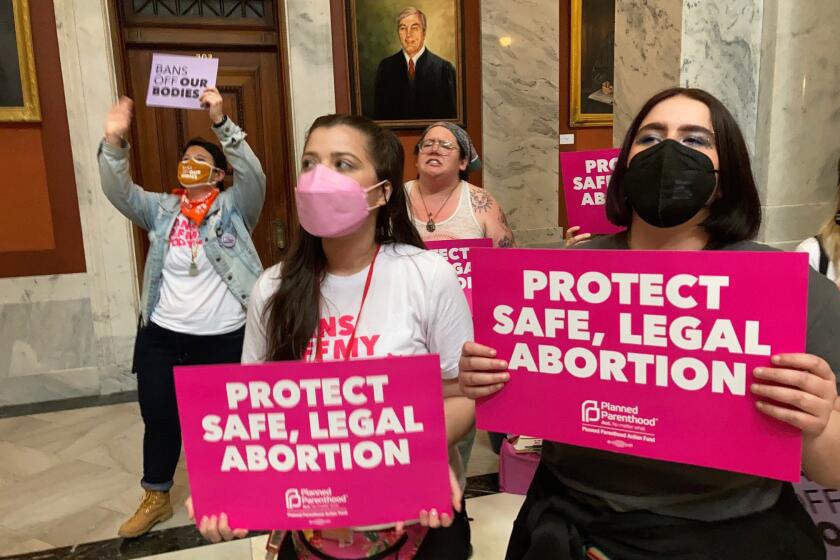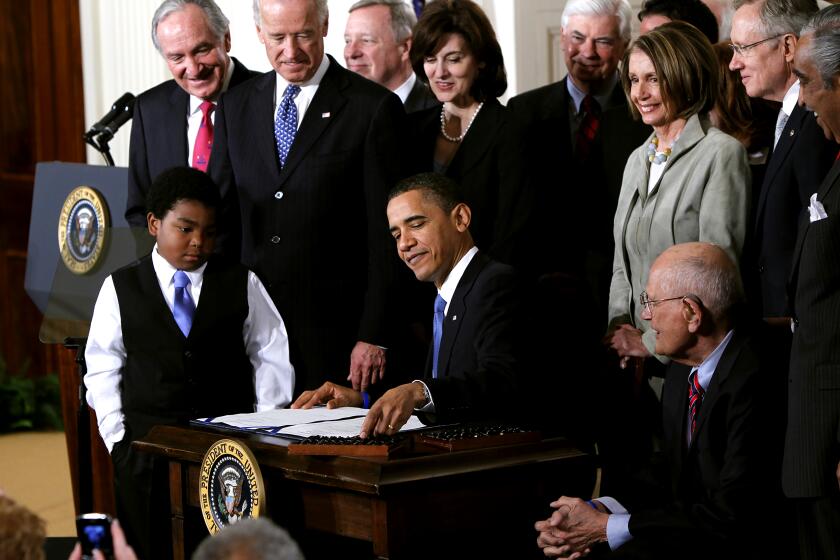Column: The GOP is back to attacking Obamacare, and making less sense than ever

- Share via
Here’s a pair of handy rules of thumb to know we’re heading into a major election cycle: (1) Republican candidates start talking about the need to repeal the Affordable Care Act, and (2) none of them bothers to say how that will make American healthcare better.
Sure enough, in just the last couple of weeks, Donald Trump has said he’s “seriously looking at alternatives” to the ACA, asserting that “the cost of Obamacare is out of control, plus, it’s not good Healthcare.”
Ron DeSantis, running for second place behind Trump in the race for the GOP presidential nomination in 2024, said Sunday on “Meet the Press” that he advocated having a plan that will “supersede Obamacare, that will lower prices for people so that they can afford healthcare while also making sure that people with preexisting conditions are protected.” He called it “a totally different healthcare plan.”
The cost of Obamacare is out of control, plus, it’s not good Healthcare.
— Donald Trump blows smoke on Truth Social
Former South Carolina Gov. Nikki Haley, running to supplant DeSantis as an also-ran in the GOP race, has been getting plenty of questions about the ACA on the campaign trail. She has managed to dodge them with word salads about how she wants to “open up all of healthcare, from the insurance companies to the hospitals to the doctors’ offices to the pharmaceutical companies and make sure we look at all of their warts.”
That might be worthwhile, if it were not just blather. The truth, of course, is that Haley’s Republican colleagues have had all the opportunities they needed to do exactly what she claimed to advocate, and did exactly none of it.
Get the latest from Michael Hiltzik
Commentary on economics and more from a Pulitzer Prize winner.
You may occasionally receive promotional content from the Los Angeles Times.
To take just one example, in August 2022, legislation to allow Medicare to negotiate the prices of its most-prescribed drugs with their manufacturers came before the Senate and House. How many Republican senators and representatives voted for it? Exactly zero. It was passed with Democratic votes and signed by President Biden, and is now the law of the land.
A couple of things are clear about this emerging Republican position on the Affordable Care Act and on U.S. healthcare more generally: They don’t have a clue about what to do with it. That doesn’t matter, because they have no intention about doing anything. They’re just gaslighting the public.
As it happens, the emerging Republican campaign against the Affordable Care Act faces more head winds today than in 2017, when a GOP repeal effort was derailed by a famous thumbs-down vote by the late Sen. John McCain (R-Ariz.).
Seeking to neuter Obamacare, right-wing state legislatures passed laws protecting the right to choose healthcare. Now they’re being used to guarantee the right to abortion.
Since its enactment, the program has built up a sizable head of steam in popularity. Adult Americans had a favorable view of Obamacare by a 59%-40% margin, according to a May tracking poll by the Kaiser Family Foundation (KFF).
The program has consistently gained in popularity since December 2016, the poll showed; 89% of Democrats and 62% of independent voters favored the program, while only 26% of Republicans viewed it favorably — a clue to why GOP candidates have dusted off their attacks.
As is all too often the case, the positions of DeSantis and Haley raise an enduring question about Republican politicians: Who do they think they represent?
It couldn’t be their constituents. We know this because the rates of participation in ACA marketplace plans in Florida and South Carolina are among the highest in the nation. Florida’s marketplace enrollment of 3.1 million residents (14.5% of its population) is the largest of any state — it’s nearly double that of California even though it has about half as many residents. South Carolina’s enrollment of 379,000 (about 7.2% of its residents) is tied with two other states in the country.
Moreover, both states are among the national leaders in the percentage of their marketplace enrollees receiving federal premium subsidies — Florida ranks second with 97%, behind only Mississippi, and South Carolina is tied in 13th place at 94%.
Both states also are among the national leaders in the share of their marketplace enrollees eligible for additional savings on deductibles and cost-sharing because of their low incomes: Florida ranks fourth, with 62%, and South Carolina is tied with California and Indiana in 19th place.

That means that the consequences of any effort to repeal the Affordable Care Act would fall heavily on their own voters, more than those in most other states. But the carnage would extend nationwide.
The Affordable Care Act has been linked to a historic decline in the national uninsured rate, falling to 8% in early 2022. The ACA also is associated with a slowdown in the growth rate of healthcare spending as measured in 2021. Some 35 million Americans are enrolled in ACA health plans, including 21 million covered by the ACA’s Medicaid expansion in the 40 states that have accepted it.
Without a replacement healthcare program — which the Republicans have never proposed — the old system in which health plans in the individual market were empowered to reject coverage for people with preexisting conditions or charge them inflated premiums would return.
More than 135 million Americans with preexisting conditions would be in this fix, with more than 54 million possibly becoming uninsurable at any price. A reminder, in case you’ve forgotten the pre-Obamacare hell facing those with medical conditions: the rejection guidelines from Blue Cross of California ran to 25 pages.
In 2001, the Kaiser Family Foundation and Georgetown University ran a test by applying for coverage from 19 insurers in eight local markets, on behalf of seven hypothetical applicants with health issues. The test conditions were hay fever, a knee injury, asthma, a previous cancer diagnosis, depression, hypertension and HIV.
Each putative enrollee made 60 applications. Not a single applicant received 60 “clean” offers — acceptances without premium surcharges or coverage exclusions.
In that era, it was legal for insurers to impose annual or lifetime caps on benefits. Women, especially those of childbearing age, were routinely charged more than men. Pregnancy coverage was almost unattainable.
If Obamacare were repealed, those 21 million Americans covered by the Medicaid expansion would lose their coverage. As many as 2.3 million people younger than 26 might be thrown off their parents’ health plans.
To be fair, DeSantis’ and Haley’s approach to the ACA does dovetail with their documented commitment to the health of their state residents, which is essentially nonexistent. Neither state has expanded Medicaid, as they could have done under the ACA, with the federal government picking up almost all the tab.
Twelve red states still haven’t taken advantage of Obamacare’s economic benefits.
That makes healthcare appreciably more expensive for their lowest-income constituents, and probably accounts for the greater rate of enrollment in marketplace plans in Florida relative to California, which did expand Medicaid.
Yet DeSantis’ record is especially shameful. His handpicked state surgeon general, Joseph Ladapo, is one of the nation’s leading purveyors of dangerous healthcare balderdash. Ladapo has promoted the useless COVID-19 “treatments” ivermectin and hydroxychloroquine. He has counseled younger Floridians against COVID-19 vaccination, basing his advice on fabricated data.
The prospect that a President DeSantis could give this man a federal platform to inject his disinformation into the American healthcare bloodstream is nothing short of terrifying. We can see the potential impact in the COVID-19 death rates in Florida, which thanks to DeSantis’ policies are close to the worst in the nation.
As of March 10 this year, Florida’s rate was 404 per 100,000 residents, 12th worst in the nation, according to Johns Hopkins University. California’s rate of 256 per 100,000 was the 11th best.
DeSantis’ peanut gallery defends his record by asserting that Florida’s demographics are among the oldest in the U.S., and since older people are more susceptible to dying from the disease, it’s understandable that its overall rate would be high. But that won’t wash. In the first place, DeSantis always claimed that his policy was to take special steps to protect Florida’s seniors; quite obviously, he didn’t succeed in doing so.
Furthermore, three of the four states with older demographics than Florida — Maine, New Hampshire and Vermont — have much lower COVID death rates; Vermont’s rate is the second lowest in the nation, after Hawaii. (The outlier is West Virginia.) But they also had stricter anti-COVID policies, and didn’t employ a walking firehose of COVID misinformation and disinformation as surgeon general.
If Trump, DeSantis and Haley devoted any thought to America’s healthcare landscape, they would stop talking about repealing and “supplanting” the ACA and come up with concrete suggestions to make it better. Instead, they wield their attacks on Obamacare like shibboleths.
They’re the easiest way to excite the MAGA base without actually doing anything. All they’ve proven is the old adage that talk is cheap.
More to Read
Get the latest from Michael Hiltzik
Commentary on economics and more from a Pulitzer Prize winner.
You may occasionally receive promotional content from the Los Angeles Times.













